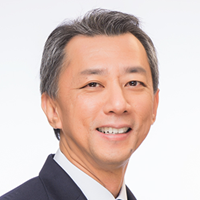Bits and Bytes of a Sustainable Future
Digital technologies have advanced more rapidly than any innovation in our history, with new applications and solutions disrupting industries faster than ever before. In the new digital economy, we see business models, enterprises and careers emerging that didn’t exist even just a few years ago. The pace of change will only get faster, bringing with it quantum advances in technology, improvements in lives and livelihoods, but also, challenges, risks and even ethical considerations that have to be balanced and managed. How do we continue charting pathways towards a shared digital future that is inclusive and sustainable for everyone?
Join Mr Chia Song Hwee, Deputy Chief Executive Officer, Temasek, as he discusses the investment company’s views on:
- Macro trends being driven by technology and digitisation
- Opportunities and challenges in the digital world
- Navigating the risks and challenges arising from the changes

MR CHIA SONG HWEE
Deputy Chief Executive Officer, Temasek International
|
|
Chia Song Hwee is the Deputy Chief Executive Officer at Temasek. In February 2021, he was appointed to the board of A*STAR (Agency for Science, Technology and Research). Song Hwee also serves as a member of Singapore’s Advisory Council on the Ethical Use of AI and Data, established by the Infocomm Media Development Authority (IMDA) since 2018. Prior to joining Temasek in 2011, Song Hwee was the Chief Operating Officer at GLOBALFOUNDRIES. Before the integration of GLOBALFOUNDRIES and Chartered Semiconductor Manufacturing Ltd (Chartered), he served as Director of the Board, and President and CEO of Chartered from 2002 to 2009. Song Hwee also held various management positions at Chartered, including Senior Vice President, Chief Financial Officer, and Chief Administrative Officer.
Prior to Chartered, Song Hwee was Regional Controller for Asia, Australia, and the Middle East for the drilling group of Schlumberger, a global oilfield services group. Song Hwee holds a Bachelor of Business (Accountancy) degree with distinction, from Edith Cowan University, Australia, and is a member of CPA Australia. He was honoured with the EE Times Annual Creativity in Electronics Award for Executive of the Year in 2007.
|